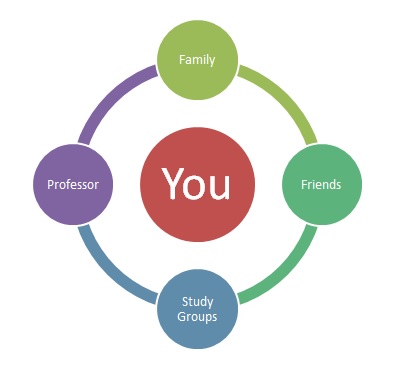A support network can include a variety of forms of interaction with a range of people who can support you in different ways. Social networking and other forms of technology make it easy to communicate quickly and with many people different people. Building relationships and spending face-to-face time with people who support us can help us find balance and promote academic success.
Spending time with friends or classmates helps you effectively learn college material. Research has shown that college students learn as much if not more from peers than they do from instructors and textbooks (Cuseo, Fecas, & Thompson, 2007). Collaborating with faculty and staff is also important though. Student-faculty interaction positively influences academic achievements such as maintaining higher GPAs, obtaining degrees, graduating with honors, and enrolling in graduate or professional schools (Astin, 1993).
It's also important to keep in touch with your family and loved ones. Students who move away from home to attend college sometimes feel the need to break away from their families and old friends completely. Although relationships will change and grow as you journey through your academic career, the friends and family that supported you before you went to college can continue to be an important part of your support network. You can stay connected by calling home, Skyping, or writing emails or letters. Let your family know about school and other important life events. Listen to what’s happening at home as well. They may be able to give you an outside perspective that you need when you’re having a difficult or frustrating day.
Dedicating adequate time to building relationships is an important part of achieving balance. Spending too much time socializing can detract from your studies, but spending too little time may make it harder to feel supported. Finding the right balance between school, work, and socializing is an important part of establishing a positive support network.